Sep 28, 2016 | Focolare Worldwide
Manna from Heaven “I’m an Iraqi veterinarian. My work was impacted by the current historic and dramatic situation my country is going through: now, the clients are few and far between. As I tried to find a way to push on, I was promised a job with a high salary in a city far from my own. It would be a favourable solution for my family, but would have placed me far from everyone else. My parents were insisting that I accept what seemed like manna from heaven. I spoke at length with my wife and it seemed to us that it wouldn’t be opportune for us, to leave at that moment, both because of our children and because several friends whose families were in need of our support, at least our moral support. Therefore we let go of the idea, blindly entrusting ourselves to God’s love. Incredibly, already from the day after we made this difficult decision my work picked up. I’m now earning four times more than what I was before.” (Y.K. Iraq) The Unexpected “We had been married for a short time when we discovered that we were expecting our first child. Something quite unexpected was also added to that: a small lump in the breast. Exams revealed a tumour. For me and my husband, who is a doctor, it was a hard blow, the first serious one in our marriage. Just three days after talking with a specialist I underwent surgery. He and his colleagues concluded that keeping the child would only aggravate the illness: we needed to proceed with an abortion immediately, so that I could begin chemotherapy. Finally, we decided on caesarean birth in the seventh month of pregnancy, when the child would be perfectly able to survive. Only afterwards would I begin chemotherapy and radiotherapy. Eight years have gone by since then. Now, we’re expecting our third child.” (M.D. France) More Joy in Giving “I searched for happiness in the wrong way: bad company, discos, cigarettes and alcohol. My boyfriend both peddled and took drugs. I was rebellious and morose both in school and at home, I dressed strangely, always in black with clothing full of studs and spikes. And I was totally indifferent to God. When I realized I had hit rock bottom, by sheer force of will I left that boy and abandoned the friendships. But how could I resolve the sorrow and sense of emptiness that I was feeling? When I began the new schoolyear my new Religion teacher inspired trust in me. Through my conversations with him I received the gift of faith. The encounter with God-Mercy changed me totally and satisfied my longing for love. I began to pray and seek God, getting involved in volunteering, experiencing that ‘there is more joy in giving than in receiving.’ I live a normal life: I go to school and do all the things a girl of my age does, with the only difference that now I have God in my heart.” (A.R. Italy)
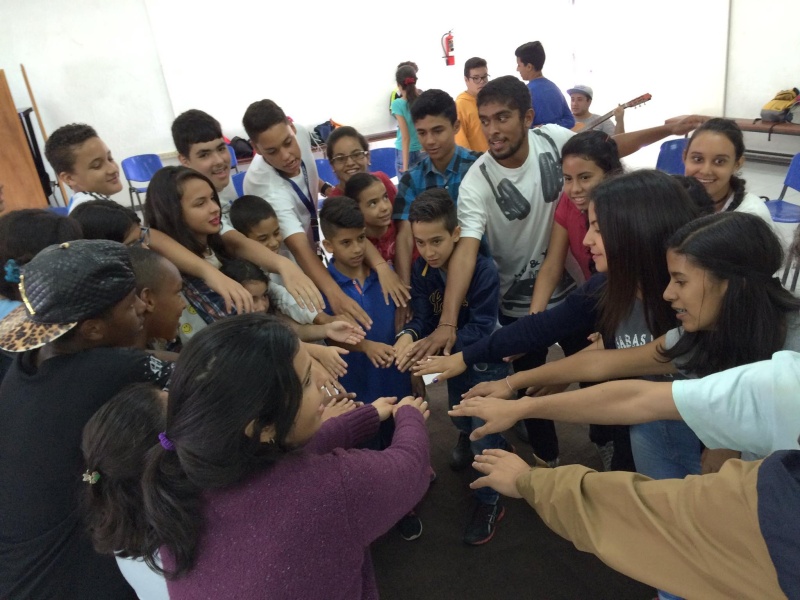
Sep 27, 2016 | Non categorizzato
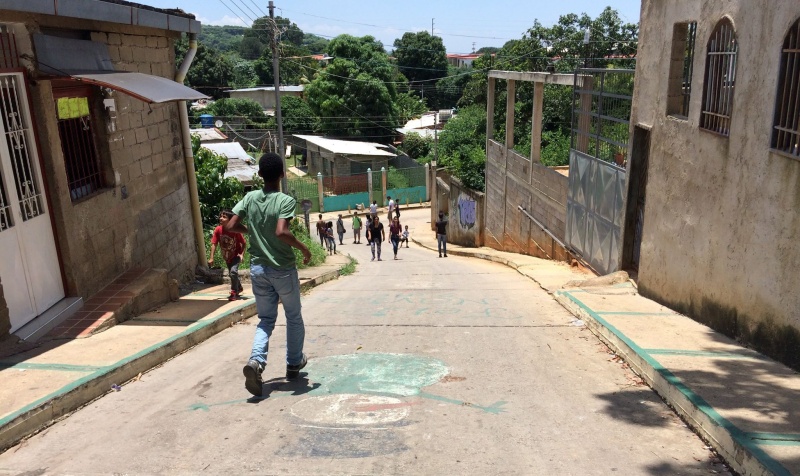 “I go back after 5 years. The impact is shocking. I don’t recognize Venezuela. The description given to me by the young man sitting next to me on the plane expresses the suffering of an afflicted but unresigned people. ‘I still have a bit of hope!’ he said to me as he described the beautiful sites in his country and invited to visit them. There’s a sense of emptiness in Caracas. Only the children provide a touch of liveliness to the absurd-looking reality. The journey to Puerto Ayucucho lasts 17 hours. Along the way my gaze is fixed on a girl rummaging in the garbage bins, looking for something to eat. But it is mostly the news of two boys 14 and 15 years old who were killed when caught stealing some mangos from a tree, that highlights the level of fear and non-sharing that has been reached. This is another form of homicide that is caused by hunger. The city is on the Colombia border. Its festering wound is represented in the murders of young people who, in the eyes of those who should protect them, appear to be violent thieves to be served the ulitmate punishment. This is also what happened to Felipe Andrés, a young seventeen-year-old who protected his brother by not telling those who had taken Felipe from his grandmother’s house where his brother could be found. Because of that he was brutally murdered with 17 bullets to match his age.
“I go back after 5 years. The impact is shocking. I don’t recognize Venezuela. The description given to me by the young man sitting next to me on the plane expresses the suffering of an afflicted but unresigned people. ‘I still have a bit of hope!’ he said to me as he described the beautiful sites in his country and invited to visit them. There’s a sense of emptiness in Caracas. Only the children provide a touch of liveliness to the absurd-looking reality. The journey to Puerto Ayucucho lasts 17 hours. Along the way my gaze is fixed on a girl rummaging in the garbage bins, looking for something to eat. But it is mostly the news of two boys 14 and 15 years old who were killed when caught stealing some mangos from a tree, that highlights the level of fear and non-sharing that has been reached. This is another form of homicide that is caused by hunger. The city is on the Colombia border. Its festering wound is represented in the murders of young people who, in the eyes of those who should protect them, appear to be violent thieves to be served the ulitmate punishment. This is also what happened to Felipe Andrés, a young seventeen-year-old who protected his brother by not telling those who had taken Felipe from his grandmother’s house where his brother could be found. Because of that he was brutally murdered with 17 bullets to match his age. 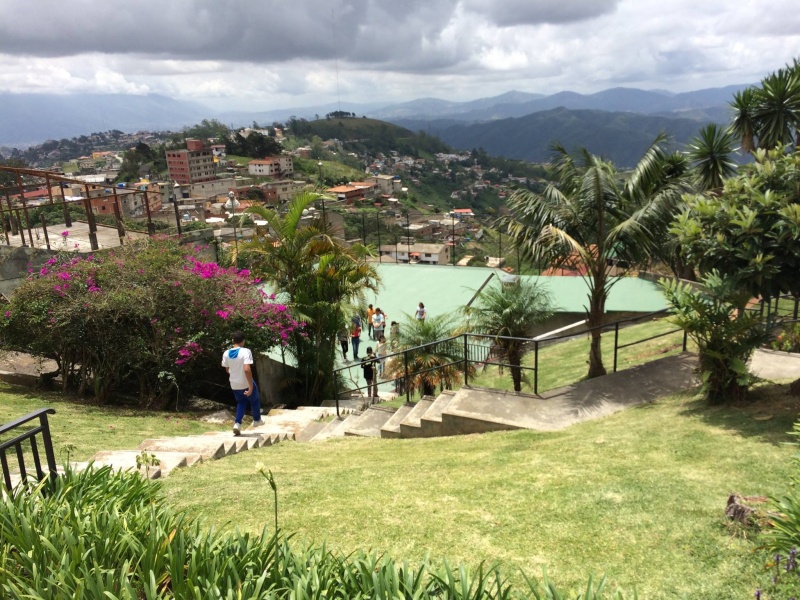 We’re in one of the quarters outside Valencia. I’m surprised by the queue for buying gas tanks. Twelve year-old Angel, candid as an angel, confides with disarming simplicity: ‘I don’t grow because I never drink milk.’ Even powdered milk is a luxury item in this country. I’m left impressed by the lively, simple gazes of the little ones I have met. An evening with the youth. You can feel their strong and palpable desire for redemption. Their experiences strengthen their desire to be carriers of hope, beginning with their friends at school, at work…. La Nuvoletta. A minibus takes us up to the Mariapolis Centre called La Nuvoletta. On the way we pass through some poverty-stricken areas. Here too, we find long queues of people hoping to be able to buy at least something. Gabriel thanks me for the lunch I offered him. ‘You know, I only eat pasta on Sunday.’ ‘And the other days?’ I ask. ‘On the other days, only sopa.’ I ask him if he likes being with people. “Yes,” he tells me, “because here everybody’s happy.”
We’re in one of the quarters outside Valencia. I’m surprised by the queue for buying gas tanks. Twelve year-old Angel, candid as an angel, confides with disarming simplicity: ‘I don’t grow because I never drink milk.’ Even powdered milk is a luxury item in this country. I’m left impressed by the lively, simple gazes of the little ones I have met. An evening with the youth. You can feel their strong and palpable desire for redemption. Their experiences strengthen their desire to be carriers of hope, beginning with their friends at school, at work…. La Nuvoletta. A minibus takes us up to the Mariapolis Centre called La Nuvoletta. On the way we pass through some poverty-stricken areas. Here too, we find long queues of people hoping to be able to buy at least something. Gabriel thanks me for the lunch I offered him. ‘You know, I only eat pasta on Sunday.’ ‘And the other days?’ I ask. ‘On the other days, only sopa.’ I ask him if he likes being with people. “Yes,” he tells me, “because here everybody’s happy.”  At the departure time, another bombshell: I learn that Fabián, such an innocent and lively child, had lost his father a few months earlier, murded by assassins. It felt like I was reliving my own experience: the illness and death of my father, which led me back to God. We look at each other and seem to understand one another. We arrive in Maracaibo, the hottest city in Venezuela. We look around and travel the 8 or more kilometres across the bridge that connects Maracaibo to San Francisco. A day with the Young For Unity awaits us in Tamale. Hearing a thirteen-year-old say: “I encouraged my mother to forgive those who had killed my father,” cannot leave you indifferent. The next appointment was in a parish. They greeted us with songs and then the dicusssion began: ‘What do you do when a kid tells you that he doesn’t go home because there’s nothing to eat?’ I try to respond by talking about the suffering and silence on the part of God that Jesus felt on the Cross. We say goodbye with a thought that one of the boys shared with everyone: ‘The strength of love is stronger than suffering’.” (A. S.)
At the departure time, another bombshell: I learn that Fabián, such an innocent and lively child, had lost his father a few months earlier, murded by assassins. It felt like I was reliving my own experience: the illness and death of my father, which led me back to God. We look at each other and seem to understand one another. We arrive in Maracaibo, the hottest city in Venezuela. We look around and travel the 8 or more kilometres across the bridge that connects Maracaibo to San Francisco. A day with the Young For Unity awaits us in Tamale. Hearing a thirteen-year-old say: “I encouraged my mother to forgive those who had killed my father,” cannot leave you indifferent. The next appointment was in a parish. They greeted us with songs and then the dicusssion began: ‘What do you do when a kid tells you that he doesn’t go home because there’s nothing to eat?’ I try to respond by talking about the suffering and silence on the part of God that Jesus felt on the Cross. We say goodbye with a thought that one of the boys shared with everyone: ‘The strength of love is stronger than suffering’.” (A. S.)

Sep 26, 2016 | Focolare Worldwide, Senza categoria
 John: “At the beginning of the school year, our son came home after his first day in year 11 and said to my wife that he was not returning to school – he said that he couldn’t stand people! He disappeared silently into his room for over a year, coming out only when he thought we were asleep. He withdrew from me entirely and only talked to his mother sporadically. I felt completely abandoned and lost, but Claire’s love managed to help me accept the rejection. What helped me was the phrase of the Gospel: ‘As I have loved you, so you must love one another’ (Jn 13:34). One night he made a desperate decision to commit suicide. As we called for an ambulance, he climbed out a window and ran away. The next hours were a blur: the ambulance arrived but he was gone; police support came too. He eventually came back and he was rushed to hospital for treatment. A week in hospital intensive care for someone stricken with panic and terror of people and spaces is a pretty scary thing. Night after night, and day after day, we slept in shifts so one of us would be there whenever he woke up. That ‘night shift’ was the only concrete love I could offer him; I could at least be a presence if needed – something I know that he later understood. When he came home, we thought that we could keep up that 24 hour suicide watch, but pretty soon had to accept that this was humanly impossible. We prayed together in a new way seeking God’s will. Together we offered and entrusted to God our son – His son – accepting completely that we could not prevent him trying to commit suicide again. I well remember the fear, pain, emptiness, anguish and hopelessness of this time, and then, in my acceptance of this terrible role, the feeling of real union with God and with Claire. In the year that followed, we managed to get him to reluctantly agree to enter a day therapy program. We hung in with our background support role and I think that God did the rest from the mundane of our ever-extending health insurance cover, to the miraculous – of an incredible group of fractured kids who supported and lived for each other.” Claire: “One of the girls in the group, with her multiple challenges, not the least of which was drug addiction, became part of our family life, and, as time went on, she and our son grew closer together. She hung in with him and helped draw him through his anxious times. And he stood by her rugged attempts at drug withdrawal. But it wasn’t easy.” John: “Their relationship suffered a setback due to our son’s stand on drugs, his personal abhorrence of them. But slowly, over the period after release from her months of involuntary hospitalisation, they tried again and worked at rebuilding their relationship on a firmer ‘no drugs’ foundation. Eventually they decided to marry.” Claire: “But, as everyone knows, wedding preparation is a pretty stressful experience, and our soon-to-be daughter-in-law was still working in an environment where drug taking was a common way to cope with life. So the inevitable happened. Our son rang me a month before the wedding and said bleakly, ‘Mum, she’s on ice again*. What should I do?’ My heart fell through the floor, and my brain went blank. Then I said, ‘I can’t tell you what to do – only the two of you have the grace for that. But I can tell you that, if you look into your heart and you see that you have loved wisely to the very end, then that tells you that it’s time for your part to finish. But if you look into your heart and you see that there is even the smallest bit more of loving wisely that you can give, then you keep trying.’ There was a long, long pause. Then a big, sad sigh. And he said, ‘I guess I can love a bit more’. Eventually they found a place that allowed her to have an extended live-in rehabilitation program with its associated outpatient support systems. It’s now 14 hard months down the track, and she is still clean – a tribute to her continuing efforts in working with her counsellors, fuelled by her incredible love for her husband – our son – in his ‘no drugs’ stand, as well as to his extraordinary love for her through all their struggles. We’re so proud of both of them. It has been a long road for all of us. And I guess one that we’ll all travel or the rest of our lives. But what I have seen shining through all the tears is that God’s love for John and me gave us the wisdom and strength to love our son in the way he needed to the end, and that maybe our love showed our son the way to love his wife in just the way that was right for her.”
John: “At the beginning of the school year, our son came home after his first day in year 11 and said to my wife that he was not returning to school – he said that he couldn’t stand people! He disappeared silently into his room for over a year, coming out only when he thought we were asleep. He withdrew from me entirely and only talked to his mother sporadically. I felt completely abandoned and lost, but Claire’s love managed to help me accept the rejection. What helped me was the phrase of the Gospel: ‘As I have loved you, so you must love one another’ (Jn 13:34). One night he made a desperate decision to commit suicide. As we called for an ambulance, he climbed out a window and ran away. The next hours were a blur: the ambulance arrived but he was gone; police support came too. He eventually came back and he was rushed to hospital for treatment. A week in hospital intensive care for someone stricken with panic and terror of people and spaces is a pretty scary thing. Night after night, and day after day, we slept in shifts so one of us would be there whenever he woke up. That ‘night shift’ was the only concrete love I could offer him; I could at least be a presence if needed – something I know that he later understood. When he came home, we thought that we could keep up that 24 hour suicide watch, but pretty soon had to accept that this was humanly impossible. We prayed together in a new way seeking God’s will. Together we offered and entrusted to God our son – His son – accepting completely that we could not prevent him trying to commit suicide again. I well remember the fear, pain, emptiness, anguish and hopelessness of this time, and then, in my acceptance of this terrible role, the feeling of real union with God and with Claire. In the year that followed, we managed to get him to reluctantly agree to enter a day therapy program. We hung in with our background support role and I think that God did the rest from the mundane of our ever-extending health insurance cover, to the miraculous – of an incredible group of fractured kids who supported and lived for each other.” Claire: “One of the girls in the group, with her multiple challenges, not the least of which was drug addiction, became part of our family life, and, as time went on, she and our son grew closer together. She hung in with him and helped draw him through his anxious times. And he stood by her rugged attempts at drug withdrawal. But it wasn’t easy.” John: “Their relationship suffered a setback due to our son’s stand on drugs, his personal abhorrence of them. But slowly, over the period after release from her months of involuntary hospitalisation, they tried again and worked at rebuilding their relationship on a firmer ‘no drugs’ foundation. Eventually they decided to marry.” Claire: “But, as everyone knows, wedding preparation is a pretty stressful experience, and our soon-to-be daughter-in-law was still working in an environment where drug taking was a common way to cope with life. So the inevitable happened. Our son rang me a month before the wedding and said bleakly, ‘Mum, she’s on ice again*. What should I do?’ My heart fell through the floor, and my brain went blank. Then I said, ‘I can’t tell you what to do – only the two of you have the grace for that. But I can tell you that, if you look into your heart and you see that you have loved wisely to the very end, then that tells you that it’s time for your part to finish. But if you look into your heart and you see that there is even the smallest bit more of loving wisely that you can give, then you keep trying.’ There was a long, long pause. Then a big, sad sigh. And he said, ‘I guess I can love a bit more’. Eventually they found a place that allowed her to have an extended live-in rehabilitation program with its associated outpatient support systems. It’s now 14 hard months down the track, and she is still clean – a tribute to her continuing efforts in working with her counsellors, fuelled by her incredible love for her husband – our son – in his ‘no drugs’ stand, as well as to his extraordinary love for her through all their struggles. We’re so proud of both of them. It has been a long road for all of us. And I guess one that we’ll all travel or the rest of our lives. But what I have seen shining through all the tears is that God’s love for John and me gave us the wisdom and strength to love our son in the way he needed to the end, and that maybe our love showed our son the way to love his wife in just the way that was right for her.”
Experience shared at Health Symposium “Darkness to Light – Spirituality of Unity in Chronic Disease and Disability” Australia, July 2016
*Crystal methamphetamine
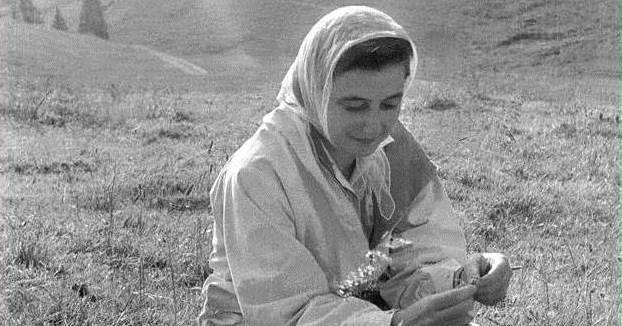
Sep 25, 2016 | Non categorizzato
 During the summer of 1949 Chiara Lubich, who was 29 years old at the time, had an experience of light and life. Leaving that “paradise” up in the mountains was very difficult, but she understood that God wanted her to be immersed in the sufferings of humanity “drying up the waters of tribulation” in those who suffer the most. There and then she wrote these words: “I have only one Spouse on earth: Jesus Forsaken. I have no other God but Him. In Him there is the whole of Paradise with the Trinity and the whole of the earth with Humanity. Therefore what is His is mine, and nothing else. And His is universal Pain, and therefore mine. I will go through the world seeking Him in every instant of my life. What hurts me is mine. Mine the pain that grazes me in the present. Mine the pain of the souls beside me (that is my Jesus). Mine all that is not peace, joy, beautiful, lovable, serene… in a word, what is not Paradise. Because I too have my Paradise, but is that in my Spouse’s heart. I know no other. So it will be for the years I have left: athirst for pain, for anguish, for despair, for sadness, for separation, for exile, for forsakenness, for torment, for… all that is Him, and He is Sin, Hell. In this way I will dry up the waters of tribulation in many hearts nearby and, through communion with my almighty Spouse, in many far away. I shall pass as a Fire that consumes all that must fall and leaves standing only the Truth. But it is necessary to be like Him: to be Him in the present moment of life.” From: Chiara Lubich, The Cry, Ed. New City London (pp. 61-2)
During the summer of 1949 Chiara Lubich, who was 29 years old at the time, had an experience of light and life. Leaving that “paradise” up in the mountains was very difficult, but she understood that God wanted her to be immersed in the sufferings of humanity “drying up the waters of tribulation” in those who suffer the most. There and then she wrote these words: “I have only one Spouse on earth: Jesus Forsaken. I have no other God but Him. In Him there is the whole of Paradise with the Trinity and the whole of the earth with Humanity. Therefore what is His is mine, and nothing else. And His is universal Pain, and therefore mine. I will go through the world seeking Him in every instant of my life. What hurts me is mine. Mine the pain that grazes me in the present. Mine the pain of the souls beside me (that is my Jesus). Mine all that is not peace, joy, beautiful, lovable, serene… in a word, what is not Paradise. Because I too have my Paradise, but is that in my Spouse’s heart. I know no other. So it will be for the years I have left: athirst for pain, for anguish, for despair, for sadness, for separation, for exile, for forsakenness, for torment, for… all that is Him, and He is Sin, Hell. In this way I will dry up the waters of tribulation in many hearts nearby and, through communion with my almighty Spouse, in many far away. I shall pass as a Fire that consumes all that must fall and leaves standing only the Truth. But it is necessary to be like Him: to be Him in the present moment of life.” From: Chiara Lubich, The Cry, Ed. New City London (pp. 61-2)
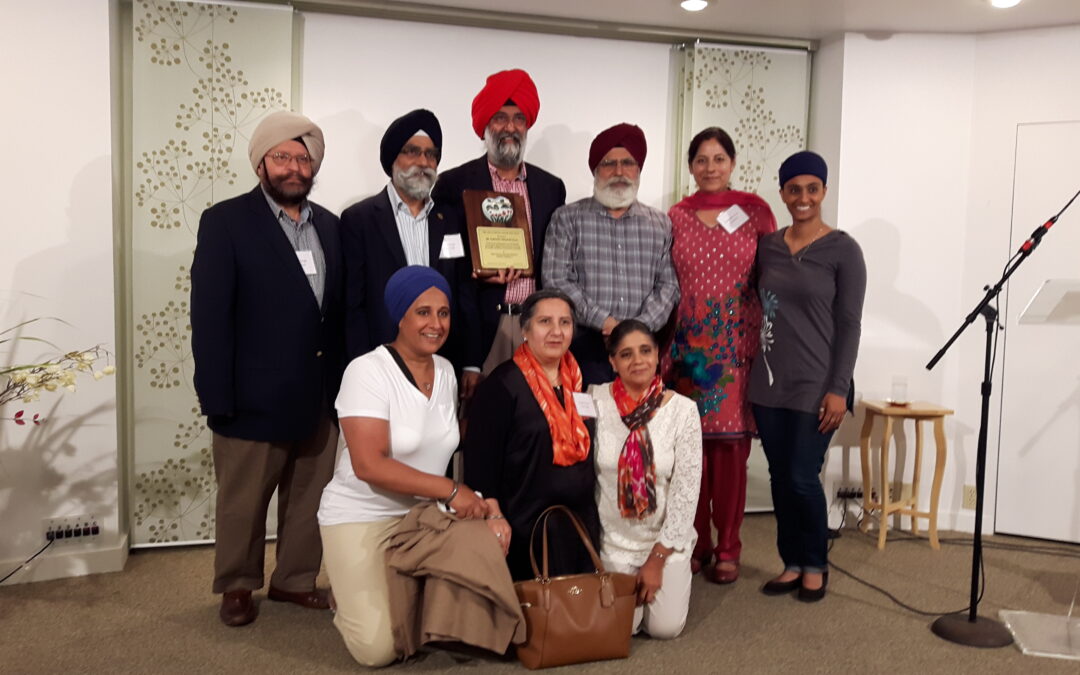
Sep 24, 2016 | Non categorizzato
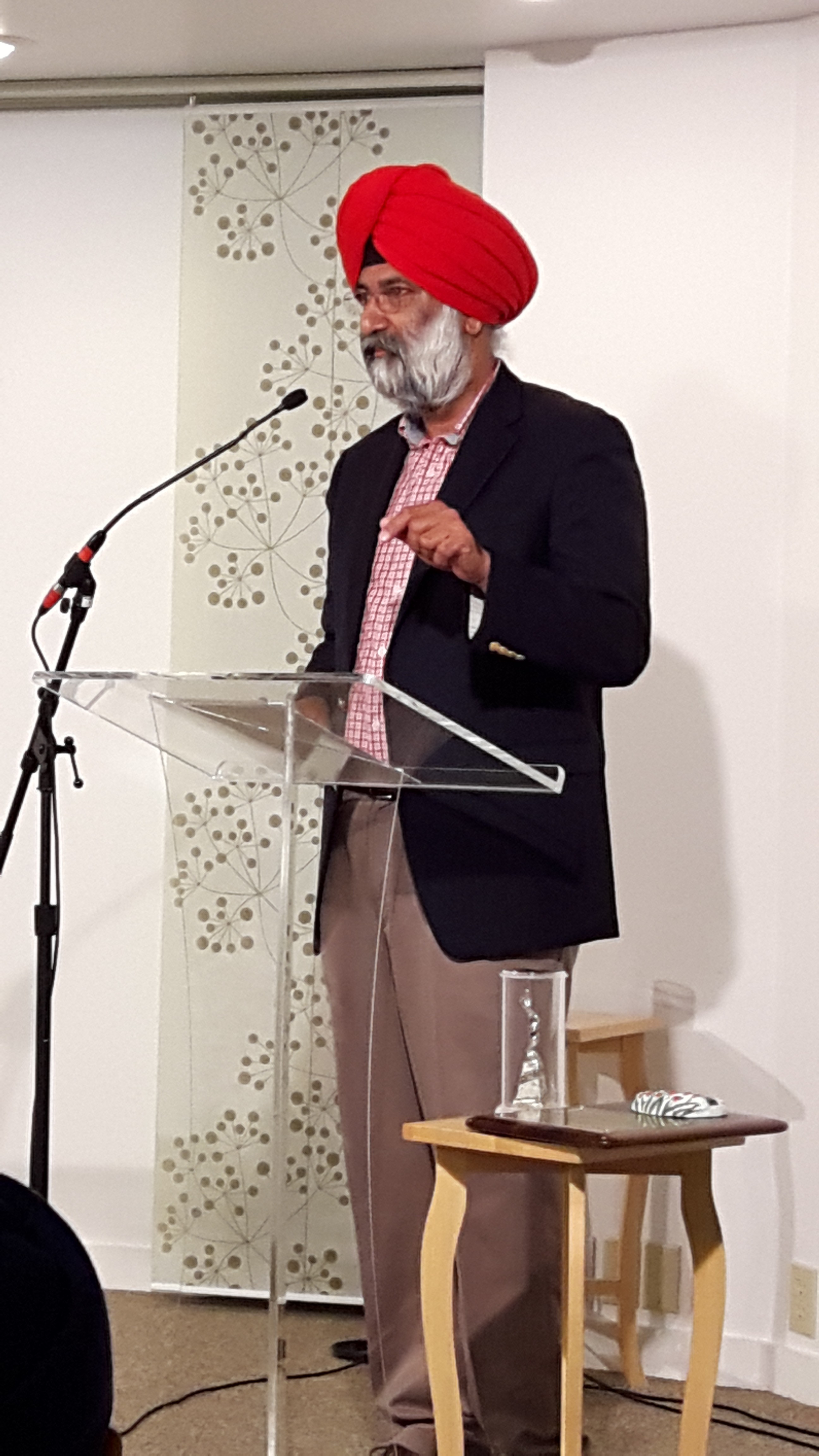 Unity, dialogue, communion – these are words that describe the heart of the mission of the Focolare, and these three words sum up the commitment of Dr Tarunjit Singh Butalia, a scientist at Ohio State University in Columbus, USA. On September 18, 2016 he accepted the 2016 Luminosa Award in Hyde Park, NY. “Your decade-long tireless effort in building bridges on various levels” said Focolare president, Maria Voce, “deserves our admiration and deep appreciation. We feel solidarity and fraternal ties with you and with the Sikh community in the promoting, together with others, peace and care of our common home.” Urged by a strong belief that religions have a crucial role to play in the great work of interreligious dialogue, in 2011 he accepted the invitation of Pope Benedict XVI to participate in the World Day of Prayer for Peace in Assisi. In his acceptance speech the scientist recalled the friendly invitations to interreligious meals and picnics that marked the beginnings of his contacts with the Focolare Movement. A friendship, he explained, that over time developed into trust. He stressed the particular role that religion has always played in American society, precisely because it is a nation of immigrants. While former waves of immigrants seamlessly blended into the people after a few generations, many immigrants from the last 50 years – like Muslims, Buddhists, Sikhs, Hindus, Jains and Baha’i – want to maintain their religious identity. Butalia said “they have made the United States one of the most cosmopolitan countries in the world.” He also observed the importance of acknowledging pluralism as a value “where each part maintains its identity and yet remains part of the harmonious whole.” “We have to focus on building relationships,’ he said; “we need to be able to talk about our differences.”
Unity, dialogue, communion – these are words that describe the heart of the mission of the Focolare, and these three words sum up the commitment of Dr Tarunjit Singh Butalia, a scientist at Ohio State University in Columbus, USA. On September 18, 2016 he accepted the 2016 Luminosa Award in Hyde Park, NY. “Your decade-long tireless effort in building bridges on various levels” said Focolare president, Maria Voce, “deserves our admiration and deep appreciation. We feel solidarity and fraternal ties with you and with the Sikh community in the promoting, together with others, peace and care of our common home.” Urged by a strong belief that religions have a crucial role to play in the great work of interreligious dialogue, in 2011 he accepted the invitation of Pope Benedict XVI to participate in the World Day of Prayer for Peace in Assisi. In his acceptance speech the scientist recalled the friendly invitations to interreligious meals and picnics that marked the beginnings of his contacts with the Focolare Movement. A friendship, he explained, that over time developed into trust. He stressed the particular role that religion has always played in American society, precisely because it is a nation of immigrants. While former waves of immigrants seamlessly blended into the people after a few generations, many immigrants from the last 50 years – like Muslims, Buddhists, Sikhs, Hindus, Jains and Baha’i – want to maintain their religious identity. Butalia said “they have made the United States one of the most cosmopolitan countries in the world.” He also observed the importance of acknowledging pluralism as a value “where each part maintains its identity and yet remains part of the harmonious whole.” “We have to focus on building relationships,’ he said; “we need to be able to talk about our differences.”  Dr Butalia then proposed to take a step further than the Golden Rule (Do to others as you would want them to do to you,” Mt 7:12). He called his version the “Platinum Rule”: “Do to others as they would want you to do to them,” moving beyond the assumption that the other people would like to be treated the way that you would like to be treated yourself.” He then invited the 130 participants to “listen more than we speak” and to never compare the “best of our religion with the worst of the others.” Referring to Islamophobia, Butalia remembered that all religions are interdependent on each other and that we have to stand up against discrimination against any faith. Closing, he quoted a disciple of the Sikh founder Guru Nanak, “No one is my enemy, and no one is a stranger. I get along with all.”
Dr Butalia then proposed to take a step further than the Golden Rule (Do to others as you would want them to do to you,” Mt 7:12). He called his version the “Platinum Rule”: “Do to others as they would want you to do to them,” moving beyond the assumption that the other people would like to be treated the way that you would like to be treated yourself.” He then invited the 130 participants to “listen more than we speak” and to never compare the “best of our religion with the worst of the others.” Referring to Islamophobia, Butalia remembered that all religions are interdependent on each other and that we have to stand up against discrimination against any faith. Closing, he quoted a disciple of the Sikh founder Guru Nanak, “No one is my enemy, and no one is a stranger. I get along with all.”
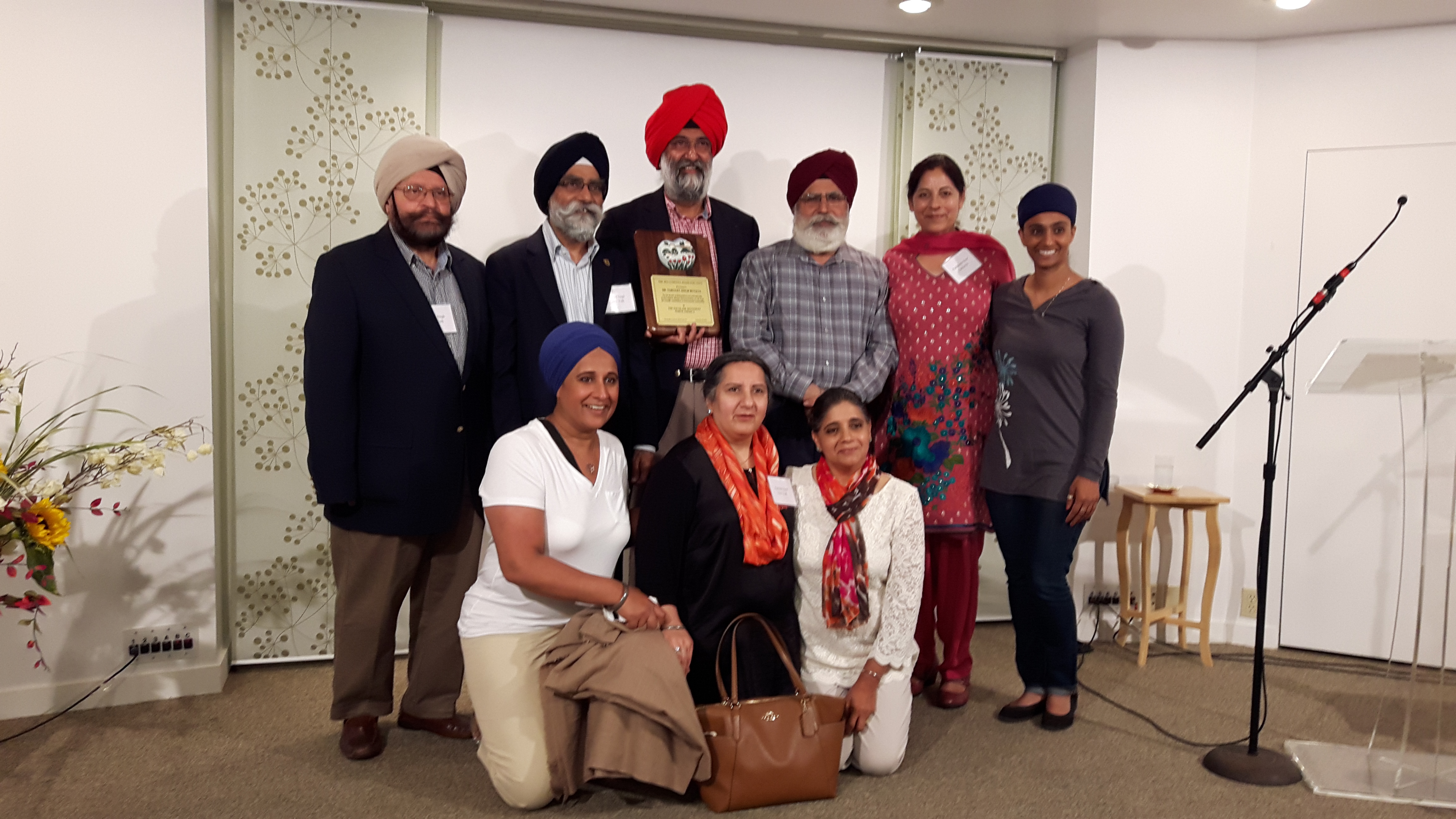
Dr Tarunjit Butalia with the Sikh delegation
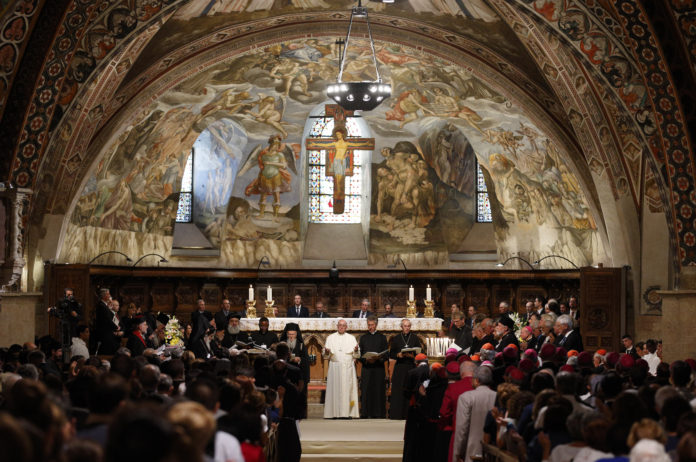
Sep 23, 2016 | Non categorizzato
 Organized by the Umbria Diocese with the Franciscan family and the St. Egidio Community, the event gathered the religious leaders of the world, and was also attended by cultured men and women and representatives of institutions. Also the Focolare Movement was present in both the preparatory and participation phases, especially the communities in Umbria and in the persons of Rita Moussalem and Roberto Catalano, heads of the Focolare’s interreligious dialogue. With his presence on 20 September, Pope Francis continued the work of John Paul II who had felt the need in 1986 to institute a day of prayer for peace, and had foreseen the role religions could play to avoid conflicts and also contribute to resolving them. In 2011, Benedict XVI had presented peace not only as a commitment of men of faith, but also as a cultural project. But the world is no longer that of the 1980s, the bipolar world of the Cold war. The world is now globalized and multipolar, where the wars have multiplied without ever being wars of religion. Pope Francis greeted each of the leaders personally, starting from a group of refugees who represented the challenges of the world today. It was not only a formal act. There were deep moments of intense bonding that were able to establish important ties for the future. A second moment was the luncheon at the Holy Convent, to which the Pope had invited all to be by his side. Having a meal together under the same roof was in itself an act of peace, after which, a common moment of prayer followed, but not together. Each religion had a facility where members could go to pray for world peace, according to their own religious tradition. Each did so distinctly; this fact aimed to cancel the doubt that these moments were an attempt to amalgamate all religions together. The Christians prayed together to demonstrate that unity among the Churches is fundamental in giving important contribution to peace, as followers of Christ.
Organized by the Umbria Diocese with the Franciscan family and the St. Egidio Community, the event gathered the religious leaders of the world, and was also attended by cultured men and women and representatives of institutions. Also the Focolare Movement was present in both the preparatory and participation phases, especially the communities in Umbria and in the persons of Rita Moussalem and Roberto Catalano, heads of the Focolare’s interreligious dialogue. With his presence on 20 September, Pope Francis continued the work of John Paul II who had felt the need in 1986 to institute a day of prayer for peace, and had foreseen the role religions could play to avoid conflicts and also contribute to resolving them. In 2011, Benedict XVI had presented peace not only as a commitment of men of faith, but also as a cultural project. But the world is no longer that of the 1980s, the bipolar world of the Cold war. The world is now globalized and multipolar, where the wars have multiplied without ever being wars of religion. Pope Francis greeted each of the leaders personally, starting from a group of refugees who represented the challenges of the world today. It was not only a formal act. There were deep moments of intense bonding that were able to establish important ties for the future. A second moment was the luncheon at the Holy Convent, to which the Pope had invited all to be by his side. Having a meal together under the same roof was in itself an act of peace, after which, a common moment of prayer followed, but not together. Each religion had a facility where members could go to pray for world peace, according to their own religious tradition. Each did so distinctly; this fact aimed to cancel the doubt that these moments were an attempt to amalgamate all religions together. The Christians prayed together to demonstrate that unity among the Churches is fundamental in giving important contribution to peace, as followers of Christ.  The concluding ceremony took place in the square in front of the Basilica of St. Francis. The leaders of each religion sat in a semicircle around Pope Francis, as a sign that nobody claimed superiority, notwithstanding the esteem and recognition of the Pope of Rome. His name, his example of a measured life, his words and gestures were constantly cited in the course of the 29 panels or round tables that were held during the prior two days in every corner of Assisi. The conclusion was marked by profound and vital considerations by the Christian, Buddhist and Muslim leaders, and also by moving testimonials: that of a young Syrian mother who arrived in Italy through the humanitarian corridors and that of an elderly Jewish Rabbi, who survived the Nazi concentration camps. The evening was heightened by the speech of Pope Francis who traced a peace roadmap. In fact, «Only peace is holy, not war!» The Pope expressed the meaning of peace by speaking of forgiveness, acceptance, collaboration and education as the fundamental elements to make it possible. «Our future is to live together», he affirmed. It is an idea that universalises the interpretation of the great Bauman who, in the opening ceremony, had underlined how humanity is called today to live the dimension of “we,” and forget the “they.” Once again the framework of Assisi was a decisive element. In fact, peace here is present even in the air we breathe. During these days the Franciscan family offered an example of humble, intelligent and respectful hospitality, constantly at the service of the leaders of the different faiths. It was an evident demonstration of how the humbleness of Francis of Assisi spoke out and asked his followers to make this a fundamental condition for dialogue and peace. It was a sign that peace is built by all of us together, and that each one brings a unique and indispensable gift for the processes of peace. by Roberto Catalano Source: New City
The concluding ceremony took place in the square in front of the Basilica of St. Francis. The leaders of each religion sat in a semicircle around Pope Francis, as a sign that nobody claimed superiority, notwithstanding the esteem and recognition of the Pope of Rome. His name, his example of a measured life, his words and gestures were constantly cited in the course of the 29 panels or round tables that were held during the prior two days in every corner of Assisi. The conclusion was marked by profound and vital considerations by the Christian, Buddhist and Muslim leaders, and also by moving testimonials: that of a young Syrian mother who arrived in Italy through the humanitarian corridors and that of an elderly Jewish Rabbi, who survived the Nazi concentration camps. The evening was heightened by the speech of Pope Francis who traced a peace roadmap. In fact, «Only peace is holy, not war!» The Pope expressed the meaning of peace by speaking of forgiveness, acceptance, collaboration and education as the fundamental elements to make it possible. «Our future is to live together», he affirmed. It is an idea that universalises the interpretation of the great Bauman who, in the opening ceremony, had underlined how humanity is called today to live the dimension of “we,” and forget the “they.” Once again the framework of Assisi was a decisive element. In fact, peace here is present even in the air we breathe. During these days the Franciscan family offered an example of humble, intelligent and respectful hospitality, constantly at the service of the leaders of the different faiths. It was an evident demonstration of how the humbleness of Francis of Assisi spoke out and asked his followers to make this a fundamental condition for dialogue and peace. It was a sign that peace is built by all of us together, and that each one brings a unique and indispensable gift for the processes of peace. by Roberto Catalano Source: New City
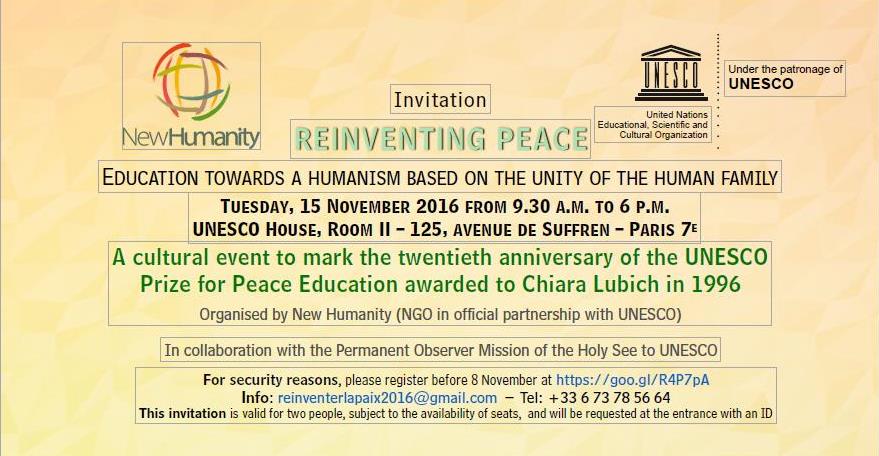
Sep 22, 2016 | Non categorizzato
 “EDUCATION TOWARDS A HUMANISM BASED ON THE UNITY OF THE HUMAN FAMILY” Paris, 19 December 1996: UNESCO awarded the prestigious Prize for Peace Education to Chiara Lubich, Founder of the Focolare Movement, in recognition of her lifelong efforts in the building of Peace, and education of thousands of people of every creed and latitude, towards this goal. The theme of peace education is more than ever actual today. Promoted by the UNESCO and the New Humanity Movement, the event will be celebrated at the UNESCO Headquarters (Paris, France) on 15 November, from 10.00 am to 6.00 pm. A representative from UNESCO will open the session, to be followed by the speeches of Bishop Francesco Follo, Permanent Observer of the Holy See to UNESCO, and Maria Voce and Jesús Morán, President and Co-President of the Focolare Movement, respectively. Other two focal points will follow: five ideas for peace education today, and dialogue in a united and plural world. Invitation: Unesco Event Registration “Reinventing Peace” event Read Chiara Lubich’s speech in 1996 Watch video (Italian) https://vimeo.com/77226264
“EDUCATION TOWARDS A HUMANISM BASED ON THE UNITY OF THE HUMAN FAMILY” Paris, 19 December 1996: UNESCO awarded the prestigious Prize for Peace Education to Chiara Lubich, Founder of the Focolare Movement, in recognition of her lifelong efforts in the building of Peace, and education of thousands of people of every creed and latitude, towards this goal. The theme of peace education is more than ever actual today. Promoted by the UNESCO and the New Humanity Movement, the event will be celebrated at the UNESCO Headquarters (Paris, France) on 15 November, from 10.00 am to 6.00 pm. A representative from UNESCO will open the session, to be followed by the speeches of Bishop Francesco Follo, Permanent Observer of the Holy See to UNESCO, and Maria Voce and Jesús Morán, President and Co-President of the Focolare Movement, respectively. Other two focal points will follow: five ideas for peace education today, and dialogue in a united and plural world. Invitation: Unesco Event Registration “Reinventing Peace” event Read Chiara Lubich’s speech in 1996 Watch video (Italian) https://vimeo.com/77226264
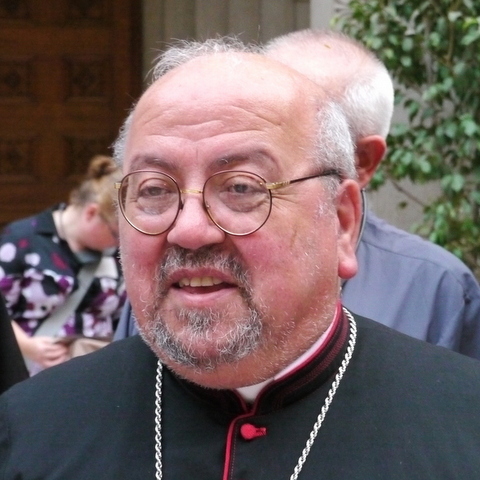
Sep 22, 2016 | Focolare Worldwide, Senza categoria
 It’s been six years since the beginning of the war in your country. What do you think have been the worst effects on society? Six years of war have shaken the very bulwark of Syrian society: the family, the basic cell that has absorbed the blows and the disgrace of this unending violence. The family was the safeguard of the country and of the Church up until 2014. But the insecurity, intolerance, violence and chaotic destruction have now completely uprooted more than two million families. Without houses and scattered all over the world, how could they have gone on under the weight of such a heavy Calvary? It was common at the beginning of the war – March 15, 2011 – to see the family gathered around a mother. The men go to war and often die. The saying now is: ‘An orphan without a father is not an orphan’. The family is left gathered around its mother who ensures the unity and the survival of the hearth. In the midst of this long and burdensome suffering these heroic mothers live in poverty and in tears. They have honoured their calling, living in tents and dying drowned. Is there any greater suffering? The destruction of the basic cell of society, and the youth? Can we count on them to look towards the future? The general mobilization that was decreed in October 2015 invited all men under the age of 45 to enter military service. It was a decision that also distressed other family members who couldn’t leave and had to stay where they were, waiting for a conclusion to this endless war. This age group that vanished had once comprised the backbone of economic activity that was still being carried out. Some reached the barracks and others chose to flee on the trail of illegal immigrants that is often irreversible. This destabilized the job market and the modest family life that found itself even more deprived of resources. What future is there for a community without young people? How has the war affected the Church? These things have weakened the Church. Families often decide to get up and go to their son who has left the country. Hence, you have the exodus of families resulting in the dizzying drop in the number of the faithful in parishes. There is the demographic imbalance: in the absence of young men, our young women who find themselves alone often marry Muslim polygamists. With fewer marriages, there are fewer baptisms. For the first time the Church finds itself facing another crucial problem as well: one in three priests in Damascus have decided to move to another more peaceful country. What can be done to keep priests in Damascus? What will come of the Church without priests? What do you think is the challenge and the hope of the Christians living in Syria today? The dead cities in the north of Syria are an unsettling photograph of what we could become. How are we to avoid becoming the guardians of brick and stone? It remains to the Christians of the East to reconsider their calling and to live along the lines of the small primitive Church that lived without protection or guarantee. Will we be capable of responding to this apostolic challenge? The Gospel encourages: ‘Fear not, little flock” (Lk 12:32).
It’s been six years since the beginning of the war in your country. What do you think have been the worst effects on society? Six years of war have shaken the very bulwark of Syrian society: the family, the basic cell that has absorbed the blows and the disgrace of this unending violence. The family was the safeguard of the country and of the Church up until 2014. But the insecurity, intolerance, violence and chaotic destruction have now completely uprooted more than two million families. Without houses and scattered all over the world, how could they have gone on under the weight of such a heavy Calvary? It was common at the beginning of the war – March 15, 2011 – to see the family gathered around a mother. The men go to war and often die. The saying now is: ‘An orphan without a father is not an orphan’. The family is left gathered around its mother who ensures the unity and the survival of the hearth. In the midst of this long and burdensome suffering these heroic mothers live in poverty and in tears. They have honoured their calling, living in tents and dying drowned. Is there any greater suffering? The destruction of the basic cell of society, and the youth? Can we count on them to look towards the future? The general mobilization that was decreed in October 2015 invited all men under the age of 45 to enter military service. It was a decision that also distressed other family members who couldn’t leave and had to stay where they were, waiting for a conclusion to this endless war. This age group that vanished had once comprised the backbone of economic activity that was still being carried out. Some reached the barracks and others chose to flee on the trail of illegal immigrants that is often irreversible. This destabilized the job market and the modest family life that found itself even more deprived of resources. What future is there for a community without young people? How has the war affected the Church? These things have weakened the Church. Families often decide to get up and go to their son who has left the country. Hence, you have the exodus of families resulting in the dizzying drop in the number of the faithful in parishes. There is the demographic imbalance: in the absence of young men, our young women who find themselves alone often marry Muslim polygamists. With fewer marriages, there are fewer baptisms. For the first time the Church finds itself facing another crucial problem as well: one in three priests in Damascus have decided to move to another more peaceful country. What can be done to keep priests in Damascus? What will come of the Church without priests? What do you think is the challenge and the hope of the Christians living in Syria today? The dead cities in the north of Syria are an unsettling photograph of what we could become. How are we to avoid becoming the guardians of brick and stone? It remains to the Christians of the East to reconsider their calling and to live along the lines of the small primitive Church that lived without protection or guarantee. Will we be capable of responding to this apostolic challenge? The Gospel encourages: ‘Fear not, little flock” (Lk 12:32).
Sep 21, 2016 | Non categorizzato
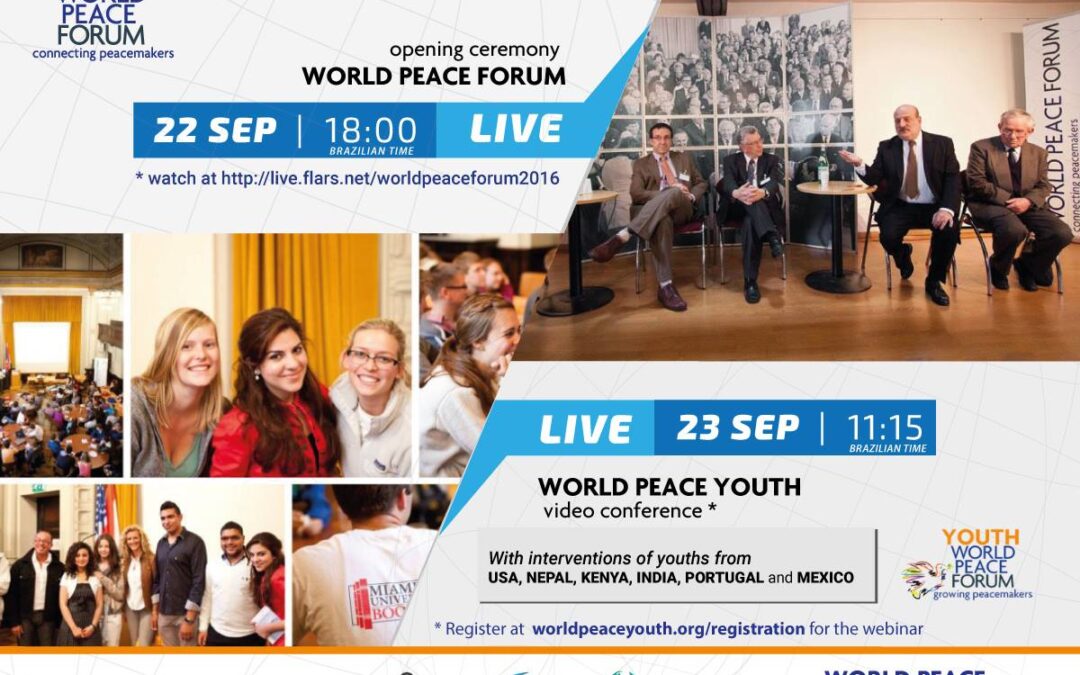
Sep 20, 2016 | Focolare Worldwide
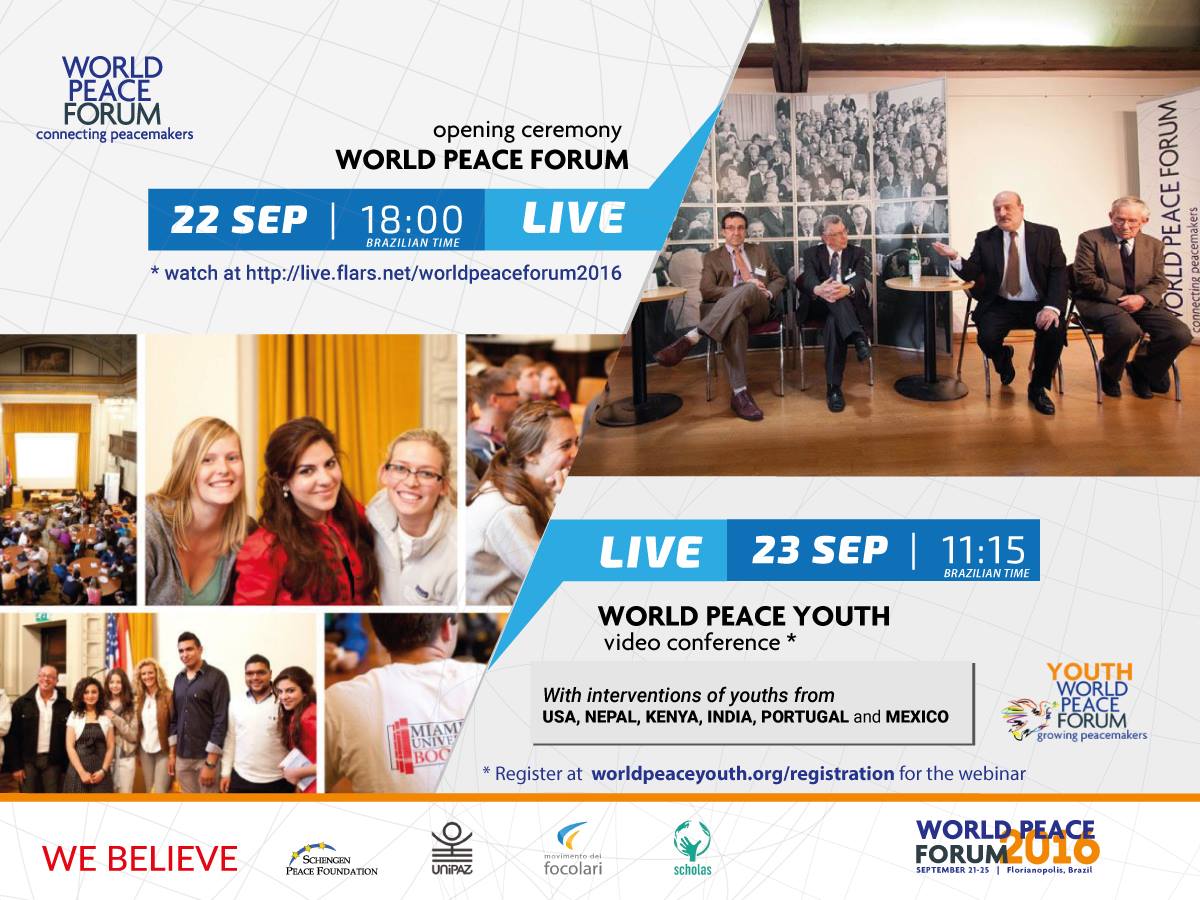 “The World Forum for Peace” will be held in Brazil, in the city of Florianópolis, during 22-25 September.
“The World Forum for Peace” will be held in Brazil, in the city of Florianópolis, during 22-25 September.
The opening ceremony of the 10th World Peace Forum and 2nd Youth World Peace Forum will be transmitted life via streaming on Thursday, 22 September, from 6 pm – 8.30pm (Brazil time)
Live transmission: http://live.flars.net/worldpeaceforum2016 On Friday, 23 September, at 11.15 am (Brazil time), there will be a Youth Video Conference. To register for the live webinar: worldpeaceyouth.org/registration Official Website for World Peace Forum 2016


 “I go back after 5 years. The impact is shocking. I don’t recognize Venezuela. The description given to me by the young man sitting next to me on the plane expresses the suffering of an afflicted but unresigned people. ‘I still have a bit of hope!’ he said to me as he described the beautiful sites in his country and invited to visit them. There’s a sense of emptiness in Caracas. Only the children provide a touch of liveliness to the absurd-looking reality. The journey to Puerto Ayucucho lasts 17 hours. Along the way my gaze is fixed on a girl rummaging in the garbage bins, looking for something to eat. But it is mostly the news of two boys 14 and 15 years old who were killed when caught stealing some mangos from a tree, that highlights the level of fear and non-sharing that has been reached. This is another form of homicide that is caused by hunger. The city is on the Colombia border. Its festering wound is represented in the murders of young people who, in the eyes of those who should protect them, appear to be violent thieves to be served the ulitmate punishment. This is also what happened to Felipe Andrés, a young seventeen-year-old who protected his brother by not telling those who had taken Felipe from his grandmother’s house where his brother could be found. Because of that he was brutally murdered with 17 bullets to match his age.
“I go back after 5 years. The impact is shocking. I don’t recognize Venezuela. The description given to me by the young man sitting next to me on the plane expresses the suffering of an afflicted but unresigned people. ‘I still have a bit of hope!’ he said to me as he described the beautiful sites in his country and invited to visit them. There’s a sense of emptiness in Caracas. Only the children provide a touch of liveliness to the absurd-looking reality. The journey to Puerto Ayucucho lasts 17 hours. Along the way my gaze is fixed on a girl rummaging in the garbage bins, looking for something to eat. But it is mostly the news of two boys 14 and 15 years old who were killed when caught stealing some mangos from a tree, that highlights the level of fear and non-sharing that has been reached. This is another form of homicide that is caused by hunger. The city is on the Colombia border. Its festering wound is represented in the murders of young people who, in the eyes of those who should protect them, appear to be violent thieves to be served the ulitmate punishment. This is also what happened to Felipe Andrés, a young seventeen-year-old who protected his brother by not telling those who had taken Felipe from his grandmother’s house where his brother could be found. Because of that he was brutally murdered with 17 bullets to match his age.  We’re in one of the quarters outside Valencia. I’m surprised by the queue for buying gas tanks. Twelve year-old Angel, candid as an angel, confides with disarming simplicity: ‘I don’t grow because I never drink milk.’ Even powdered milk is a luxury item in this country. I’m left impressed by the lively, simple gazes of the little ones I have met. An evening with the youth. You can feel their strong and palpable desire for redemption. Their experiences strengthen their desire to be carriers of hope, beginning with their friends at school, at work…. La Nuvoletta. A minibus takes us up to the Mariapolis Centre called La Nuvoletta. On the way we pass through some poverty-stricken areas. Here too, we find long queues of people hoping to be able to buy at least something. Gabriel thanks me for the lunch I offered him. ‘You know, I only eat pasta on Sunday.’ ‘And the other days?’ I ask. ‘On the other days, only sopa.’ I ask him if he likes being with people. “Yes,” he tells me, “because here everybody’s happy.”
We’re in one of the quarters outside Valencia. I’m surprised by the queue for buying gas tanks. Twelve year-old Angel, candid as an angel, confides with disarming simplicity: ‘I don’t grow because I never drink milk.’ Even powdered milk is a luxury item in this country. I’m left impressed by the lively, simple gazes of the little ones I have met. An evening with the youth. You can feel their strong and palpable desire for redemption. Their experiences strengthen their desire to be carriers of hope, beginning with their friends at school, at work…. La Nuvoletta. A minibus takes us up to the Mariapolis Centre called La Nuvoletta. On the way we pass through some poverty-stricken areas. Here too, we find long queues of people hoping to be able to buy at least something. Gabriel thanks me for the lunch I offered him. ‘You know, I only eat pasta on Sunday.’ ‘And the other days?’ I ask. ‘On the other days, only sopa.’ I ask him if he likes being with people. “Yes,” he tells me, “because here everybody’s happy.” 


 Unity, dialogue, communion – these are words that describe the heart of the mission of the Focolare, and these three words sum up the commitment of Dr Tarunjit Singh Butalia, a scientist at Ohio State University in Columbus, USA. On September 18, 2016 he accepted the 2016 Luminosa Award in Hyde Park, NY. “Your decade-long tireless effort in building bridges on various levels” said Focolare president,
Unity, dialogue, communion – these are words that describe the heart of the mission of the Focolare, and these three words sum up the commitment of Dr Tarunjit Singh Butalia, a scientist at Ohio State University in Columbus, USA. On September 18, 2016 he accepted the 2016 Luminosa Award in Hyde Park, NY. “Your decade-long tireless effort in building bridges on various levels” said Focolare president,  Dr Butalia then proposed to take a step further than the Golden Rule (Do to others as you would want them to do to you,” Mt 7:12). He called his version the “Platinum Rule”: “Do to others as they would want you to do to them,” moving beyond the assumption that the other people would like to be treated the way that you would like to be treated yourself.” He then invited the 130 participants to “listen more than we speak” and to never compare the “best of our religion with the worst of the others.” Referring to Islamophobia, Butalia remembered that all religions are interdependent on each other and that we have to stand up against discrimination against any faith. Closing, he quoted a disciple of the Sikh founder Guru Nanak, “No one is my enemy, and no one is a stranger. I get along with all.”
Dr Butalia then proposed to take a step further than the Golden Rule (Do to others as you would want them to do to you,” Mt 7:12). He called his version the “Platinum Rule”: “Do to others as they would want you to do to them,” moving beyond the assumption that the other people would like to be treated the way that you would like to be treated yourself.” He then invited the 130 participants to “listen more than we speak” and to never compare the “best of our religion with the worst of the others.” Referring to Islamophobia, Butalia remembered that all religions are interdependent on each other and that we have to stand up against discrimination against any faith. Closing, he quoted a disciple of the Sikh founder Guru Nanak, “No one is my enemy, and no one is a stranger. I get along with all.” 

 Organized by the Umbria Diocese with the Franciscan family and the St. Egidio Community, the event gathered the religious leaders of the world, and was also attended by cultured men and women and representatives of institutions. Also the
Organized by the Umbria Diocese with the Franciscan family and the St. Egidio Community, the event gathered the religious leaders of the world, and was also attended by cultured men and women and representatives of institutions. Also the 


